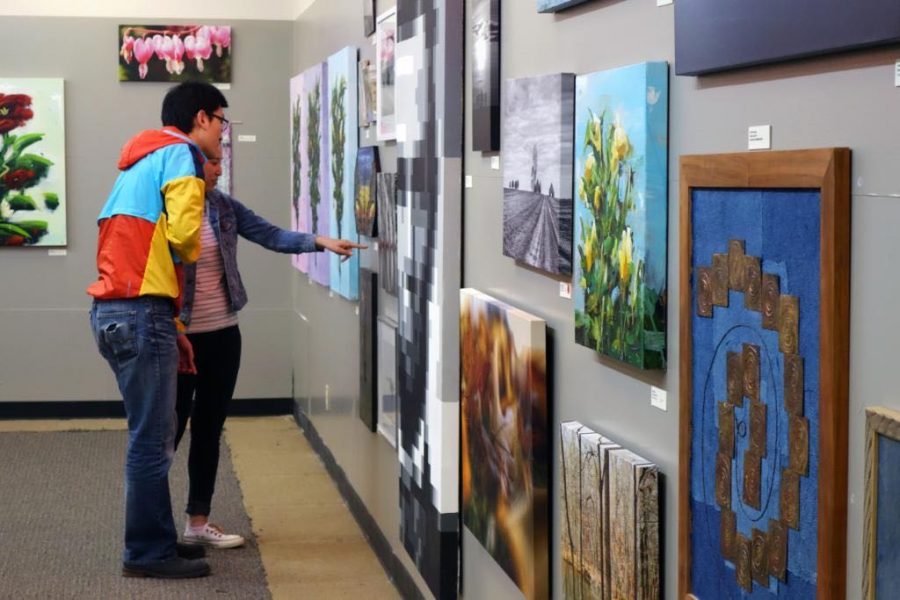COVID-19 impacts arts community
Two patrons view a piece of art at the Boneyard Arts Festival in April 2019. The festival was canceled this year due to the coronavirus.
March 24, 2020
Only a couple weeks ago, the stages and galleries at the Krannert Center for the Performing Arts were filled with music playing through the large halls and crowds of people teeming to see performances. As the end of March nears, the performing arts center is eerily empty, echoing with the uncertain, strange nature of current events, as art, a seemingly unstoppable force, has come to a standstill.
As COVID-19 rapidly spreads, Krannert Center and a number of local artists have been affected by cancellations.
“Krannert Center is, of course, following the protocols set forth by the university, state and CDC,” said Bridget Lee-Calfas, advertising and publicity director at the Krannert Center. “This included the need to cancel all remaining performances and events this season.”
“The true impact may not be realized for some time, but certainly it will be a challenge for artists and arts organizations who rely on ticket income to sustain their operations,” Lee-Calfas said. “Krannert Center will continue to work with our campus and community partners to do our best to mitigate these challenges and uncertainties.”
Shut down for the remainder of the spring semester, the Krannert Center canceled about 60 performances, ultimately affecting not only the performers, but also patrons of the highly-anticipated performances.
Get The Daily Illini in your inbox!
Lee-Calfas has been providing instruction to those with tickets. The center has offered the option for patrons to donate the cost of their tickets by contacting the ticket office by Wednesday. Whoever decides not to use this option will receive a full refund automatically.
One affected performer was professor Donald Schleicher, conductor and director of the 90-person Philharmonia Orchestra (UIPO).
Schleicher was originally supposed to conduct Mozart’s Symphony No. 38 and Elgar’s Enigma Variations. These canceled performances prove trouble for students excited to perform and practice with the Philharmonia Orchestra.
However, Schleicher devised a plan to continue his student’s musical practice, attempting “to find a way to turn the darkness into light.”
“As an educator, it remains my job to find creative ways to continue to enable the students’ orchestral education,” Schleicher said.
He will individually FaceTime or Skype each student, so they can play their instrument for him. He will then offer them advice about their playing. In addition, he will provide them past concert videos and other supplementary material he would not otherwise have.
Schleicher remains hopeful, trying to see the positive outcome of this situation.
“It has forced me to be a more creative educator,” Schleicher said. “Perhaps I’ll get better at my job.”
However, the greatest impact has been felt, both globally and locally, in the for-profit arts community.
Kelly White, executive director of 40 North 88 West Champaign County Arts Council, elaborated on the impact of such shutdowns on local art.
“So many events have had to be canceled or postponed including major art festivals, art fairs, countless performances, tours, gallery shows – critical events that provide the compensation and support that artists rely on,” White said. “It’s such a scary time with details changing and shifting on a daily basis which makes it exceptionally difficult to plan for what the future holds.”
Schleicher echoed these sentiments, commenting on the global predicament, as all Broadway shows, orchestras and ballets have closed. Even the highly-esteemed Metropolitan Opera reported their musicians’ salaries would not last past May.
“This is a terrible thing for all performing artists and for all of the constituencies that work on their behalf — from the stagehands to the music librarians to the ticket sellers. The domino effect of this will be felt for years for so many members of the arts community,” Schleicher said.
All performing arts companies — ballet, opera, musical theater and the symphony — have closed their doors, but many have put donation sites in place to support their artists and staff.
To increase donations while also providing entertainment for those forced to remain in their homes, many famous artists, such as Chris Martin, John Legend and Bruce Springsteen, have performed in their homes on Instagram or Facebook.
White applauds these efforts, as it inspires her to see the creative initiative taken by artists all over the world.
“Performers streaming their shows, working together with equally anxious and threatened small businesses, grassroots fundraisers being developed to provide financial support for artists in need, unique and safe kid-friendly undertakings that not only combat the monotony of isolation but also provide positivity and hope,” White said.
40 North is working to virtually present the now-canceled Boneyard Arts Festival, a mid-April festival that travels around Champaign sharing local art. White hopes to “still celebrate and support this remarkable creative community online while staying safe and healthy.”
As a constant source of inspiration, solace and hope to so many, these art closures may prove a harrowing symbol of our world’s uncertainty during this time. However, through the community of online artists and generous donations to the closed performing arts companies and facilities, this outbreak will be a mere pause in artistic development and elevation of our communities.
Krannert Center will reopen soon, once again providing a space for the University’s arts to thrive, while 40 North continues to uplift and connect local artists.
“Art is the most accurate indicator of the strength of a community, and we will need every aspect of the arts to get through and rebuild once these trying times are behind us,” White said. “We need the joy, vibrancy, reflectiveness and hope that the arts provide. All the hard-working artists critically enhance quality of life in Champaign County.”







